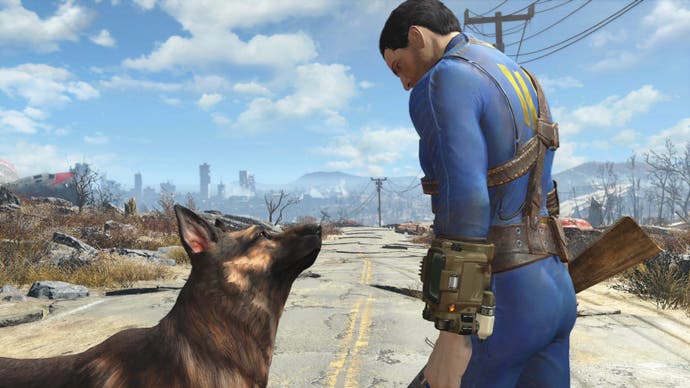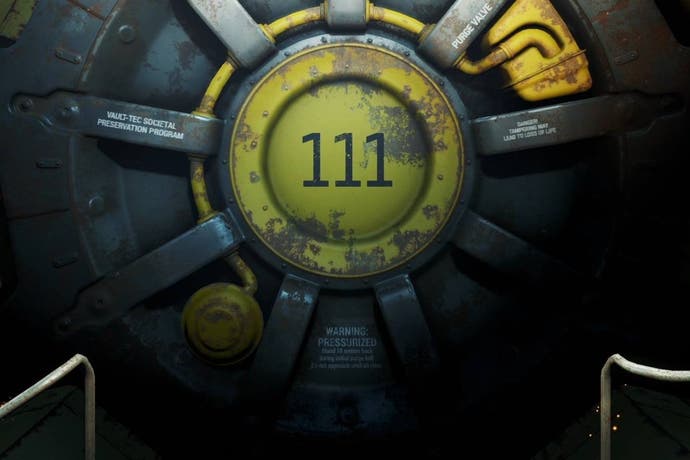A Beginner's Guide to the world of Fallout
War, war never changes.
With Fallout 4 due out in a couple of weeks, millions of people are set to leap into the post-apocalyptic open world Bethesda has spent the last few years crafting.
Not all will have played Fallout 3, Bethesda Game Studios' previous entry in the series. Nor will all have played Fallout: New Vegas, the follow-up made by Obsidian. Nor will all have played Interplay's Fallout 1 and Fallout 2, the now old-school role-playing games that sparked the franchise into life in the late nineties.
If Fallout is alien to you, if, when you hear of "the Wasteland", you think not of post-nuclear California but current day Croydon, then you're in the right place! Welcome to our beginner's guide to the world of Fallout.
The Wasteland
Who can argue with Ron Perlman, who for each Fallout game has narrated the timeless phrase: "War. War never changes"?
Here's the thing about the world of Fallout: it's like our own, but different. So, imagine our world, shortly after World War 2. Then, imagine it diverging so that the science fiction of 1950s America became reality while the culture of the time remained. So, think the retro future of The Jetsons, complete with fusion-driven cars, and robots who help with the housework.
Then, in October 2077, The Great War begins as China and the United States butt heads over ever scarcer resources. Bombs are launched. We don't know who struck first. Other countries get stuck in, and the world is devastated. Desperate, people escape to Fallout shelters called Vaults (Fallout 4's Sole Survivor and his or her family evacuates to Vault 111, situated near Sanctuary Hills, Massachusetts).
Hundreds of years later, the Fallout games begin. More often than not, we play someone who emerges from their Vault for the first time, thrust into the Wasteland and tasked with survival. A huge open world presents itself. Where do we go? What do we do? The choice is yours.
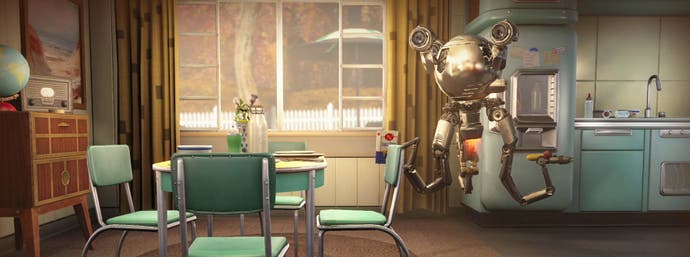
The Fallout games have taken us to a raft of locations across America, including California, the ruins of Washington, D.C., Las Vegas, now called New Vegas, and, in Fallout 4, Boston. Each Wasteland was devastated by the nuclear war to a different degree. Fallout 3's Capital Wasteland, for example, is little more than rubble. Fallout 4, however, looks like it escaped the worst of it. However badly hit, each Fallout's Wasteland is a dangerous place, packed with radiation-fuelled cockroaches, bloodthirsty Super Mutants and feral Ghouls determined to ruin your day. Don't worry, you'll love it.
While the Fallout games are set within the same world, and are linked together by common themes, tropes, mechanics and features, they offer self-contained stories. Fallout 3, for example, is set nearly 40 years after Fallout 2, which is set 80 years after Fallout 1. Fallout 4 is set in 2277, 200 years after the bombs fell. The system means Fallout veterans often spot nods to previous games and their characters, but newcomers can venture forth safe in the knowledge that they haven't had to play other Fallout games in order to get the current one.
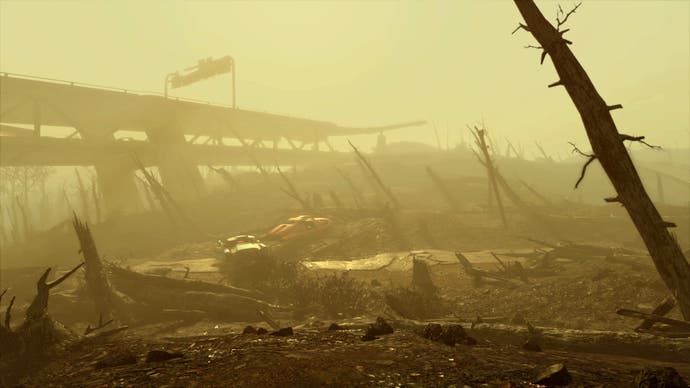
For some, Fallout is all about the Vaults. These cavernous bomb shelters are where some escaped to when the nukes went off. The twist is that Vault-Tec Corporation, the company contracted to design and produce the bomb shelters, used them for dastardly social experimentation.
Some of my most memorable Fallout moments have come from stumbling upon Vaults, creaking open their huge doors and exploring their innards. Fallout 3's Vault 112, for example, with its virtual reality pods that trapped inhabitants in a Matrix-style utopia, is as wonderful as it is disturbing. Vault 11's horrifying story of human sacrifice and mass suicide left me reeling. And who can forget Vault 108, packed, as it is, with Gary clones?
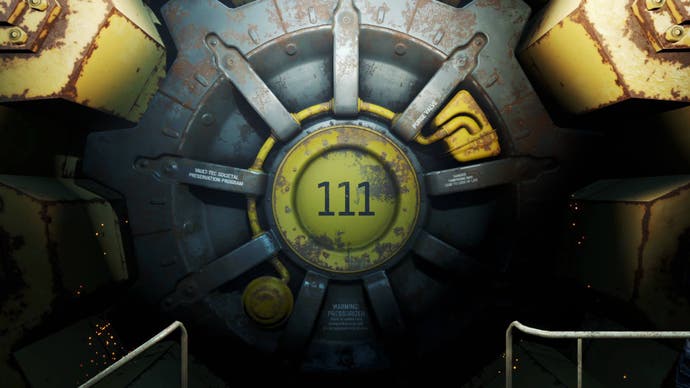
A menu system you wear on your wrist and combat that freezes time
Key to any Wasteland wanderer's survival is the Pip-Boy (Personal Information Processor). You wear your Pip-Boy on your arm for easy access to all your character's information, maps and stats. In-game, your Pip-Boy is a cool retro futuristic inventory system that shows you the characteristics of the SPECIAL character system, including perks (more on Fallout 4's perks here).
Brilliantly, your Pip-Boy doubles as a portable radio. There are usually a number of in-game stations to listen to while out and about, some of which play songs. There's something quintessentially Fallout about listening to a 1940s The Ink Spots hit while decapitating a Deathclaw.
You might have seen an image of a cheeky chappie with blonde hair who wears a blue Vault suit, a big grin and his thumb up. That's Vault Boy. Say hello! In Fallout 4 he's in your Pip-Boy, illustrating your perks with cool animations.
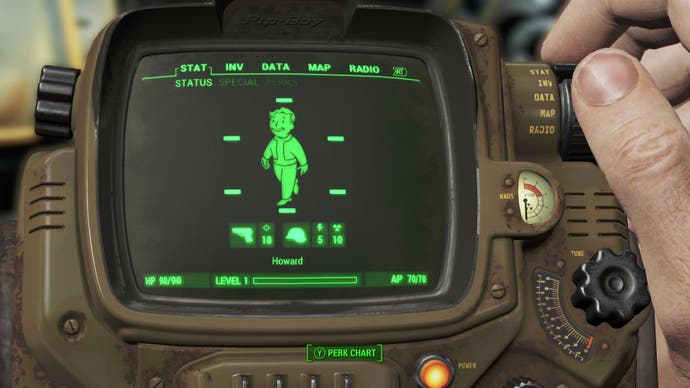
The Fallout series began life with turn-based combat that used an action point system. Bethesda used this as inspiration for Fallout 3's Vault-Tec Assisted Targeting System, or V.A.T.S.
V.A.T.S. pauses the otherwise real-time action, letting you target parts of your enemies, each with a percentage chance to hit. You could go for a headshot, for example, which, if successful, could kill your enemy. But the chance to hit may be low. Or, you could go for an easier to hit limb, which would, perhaps, disable your enemy, forcing it to drop its weapon.
Using V.A.T.S., you can queue actions, depending on the number of action points you have available, then watch them play out in all their gory glory. In Fallout 4, V.A.T.S. doesn't stop time, but it does slow it down significantly, so while you'll need to stay on your toes, you'll have time to think about how to handle difficult situations.
Enemies everywhere: The Brotherhood of Steel, Raiders, Ghouls, and Super Mutants
Yeah, Super Mutants. You'll want to use V.A.T.S. on Super Mutants.
Super Mutants are mutated humans, the result of the horrific Forced Evolutionary Virus (FEV). They're huge, strong and very, very grumpy, with green or yellowish skin. They're immune to disease and radiation, enjoy rapid regeneration, and live for ages, which helps them thrive in the Wasteland. In short, they're trouble. Mostly.
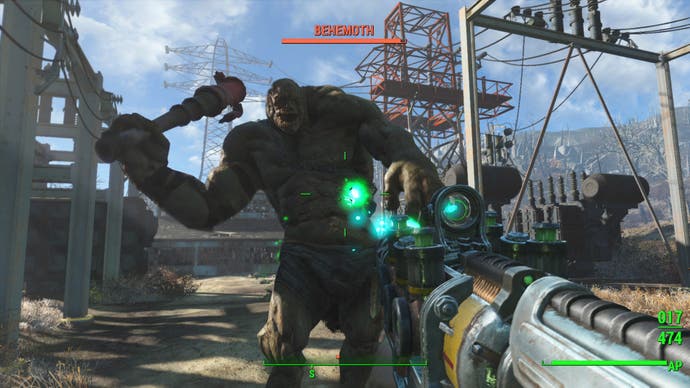
Ghouls have it bad. Like Super Mutants, they were once humans, but are now rotting. This is what happens when you spend too much time out in the Wasteland sun. Radiation is a serious business, especially when Factor five billion isn't to hand.
Unlike Super Mutants - well, most Super Mutants - Ghouls like a chat. Well, some Ghouls like a chat (the non feral ones, mostly). Generally, they're downtrodden and discriminated against, eking out a living under the heel of those more fortunate. They're misunderstood, really. So, when you run into a Ghoul, before shooting it in its decrepit face, ask yourself, "Is this really the right thing to do?"
Yeah, it probably is.
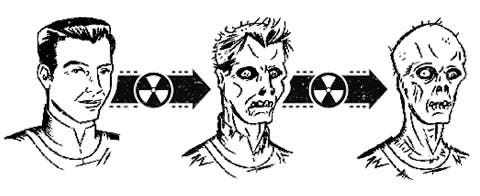
The Brotherhood of Steel are responsible for some of Fallout's most iconic imagery. The quasi-religious technology-obsessed military types patrol the Wasteland wearing intimidating Power Armour (which, by the way, is usually the best gear around), shooting lasers and flying off in Vertibirds. They hate mutants, too, the cads. Steer clear, or join their ranks. Either way, make sure you nab a suit of Power Armour for yourself.
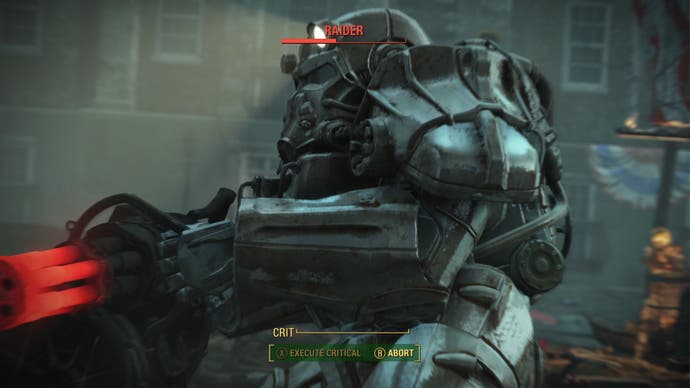
In the world of Fallout, Raiders are everywhere. In fact, they're probably around the corner right now. Watch out!
Raiders are, generally, aggressive by default, and will try to kill you on sight. They look like extras from Mad Max and shout and scream and foam at the mouth. Raider camps litter the Wasteland. They can be dangerous places best avoided, or, if you're feeling brave, opportunities. Raider corpses can be looted, their caches busted open and their beds slept in. Probably best not to sleep in their beds for too long, though. They don't like that.
Many Fallout quests involve Raiders. You may find yourself chatting to someone in a town who asks for help with their "Raider problem", someone who offers you a reward for your trouble. Take the job, claim the reward, then walk off into the sunset like a bad-ass, your soul buoyed by your good deed.
Or kill everyone in the town, loot their corpses, and walk off into the sunset like a bad-ass, your inventory bulging from the spoils of war. Such is life in the world of Fallout.
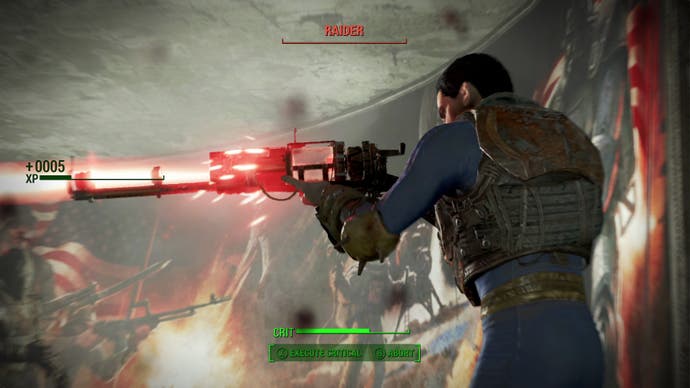
Talking your way out of trouble
I like to play the Fallout games - indeed most RPGs - as a charismatic slimebag who talks their way out of even the stickiest of circumstances. What's that? I killed your mother? Don't worry about it, mate. These things happen. What's that? You want to blow up a town? Don't worry about it, fella. Where's the harm in letting everyone live?
I often pump as many skill points into Charisma, one of the seven primary statistics in the SPECIAL character system, as possible, thus unlocking dialogue options I wouldn't otherwise see. In Fallout 3, Charisma made Speech checks easier. Speech checks are run by the game when you try to get your own way through the gift of the gab, essentially. If you fail your Speech check, you'll need to come up with another line of enquiry. Pass your Speech check, though, and, well, it's like that bit in Star Wars where Obi-Wan Kenobi tells those Stormtroopers these aren't the droids they're looking for.
Fallout is packed with perks. My favourite is Bloody Mess, which is in Fallout 3, Fallout: New Vegas and Fallout 4. It boosts your damage, but, brilliantly, it also makes your enemies explode in a, wait for it, bloody mess.
This is the thing about the world of Fallout: it's horrific, depressing, and often hilarious. It's about laughing at the ridiculous, smiling when you're dying from radiation exposure, and smirking while mulling over whether to blow up a town or not. It's listening to The Ink Spots' I Don't Want to Set the World on Fire while playing a game set in a world that was set on fire.
Fallout 3 was criticised for losing some of the humour Interplay established with Fallout 1 and 2. Obsidian brought it back, though, with New Vegas, one of the best-written games I've played. It'll be interesting to see whether Bethesda changes tack with Fallout 4, or sticks to the more serious tone it went for with its predecessor.
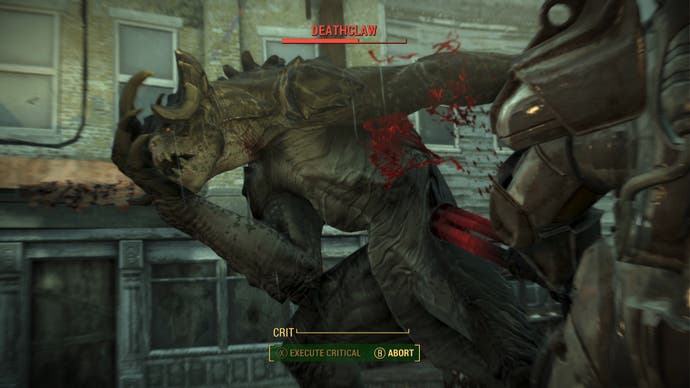
Mini-games, Nuka-Cola and Bottle Caps
In the Wasteland you'll come across loads of computers that needs to be hacked and loads of doors that need to be unlocked. This is where Fallout's hacking and lockpicking mini-games come in.
In Fallout 3 and New Vegas computer hacking involves working out the correct password. You're presented with a list to choose from. Make a choice, and you'll be told how many letters are shared between the password you picked and the correct answer. You get four attempts to win big.
The lockpicking mini-game involves using a screwdriver and bobby pins to tease open a door, ammo box or safe. Apply too much pressure to the lock and your bobby pin will snap. Be careful! Bobby pins don't grow on trees.

Fallout's soft drink of choice, Nuka-Cola is totally refreshing and totally bad for your health. Each Fallout game has featured the fizz, which tends to be warm, irradiated and flat. Yum.
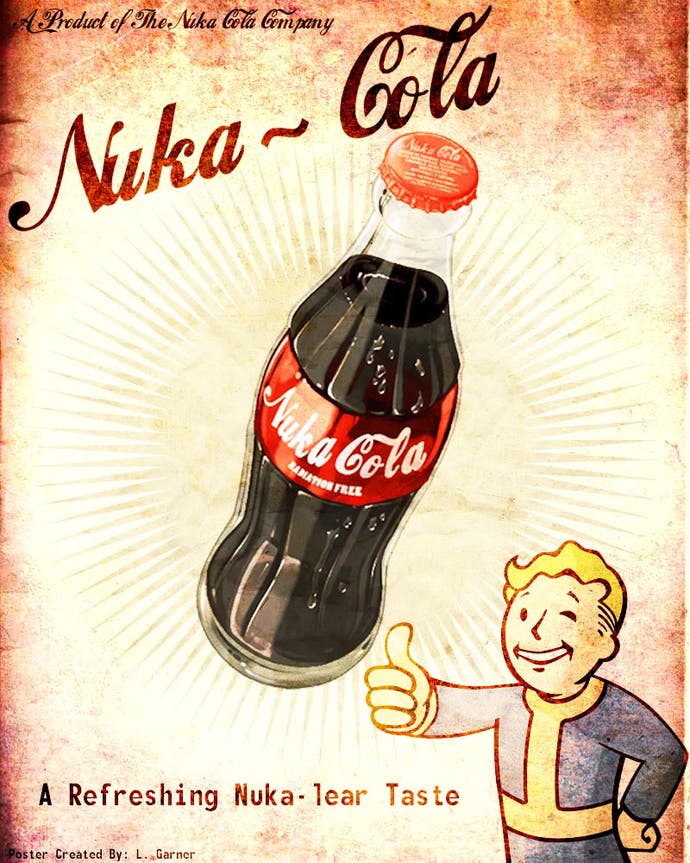
In Bethesda's Fallout 3, downing a bottle of Nuka-Cola gives you three Rads and 10 Hit Points. There's a risk / reward with the stuff, see. Yes, it restores your health, but it irradiates you, too. Drink too much and you'll get sick. You'll have plenty of health points, but you'll be sick. Sick!
In Bethesda's Fallout games, there's something called Nuka-Cola Quantum, which has twice the calories and twice the taste. There's a twist, though: the company behind it added a mild radioactive strontium isotope that caused those who drank it to wee glowing urine. Sweet!
Speaking of Nuka-Cola, when you drink a bottle, you get a single Bottle Cap, Fallout's post-apocalyptic currency. Pound coins won't get you anywhere in the Wasteland. Dollar bills aren't worth the paper they're printed on. It's all about the Bottle Caps. You use them to buy weapons, ammo, health restoring items and anything else a Wasteland vendor has for sale. So, be on the lookout for Bottle Caps. You never know when they'll save your life.
Also of note: in Fallout 3 you were able to use Bottle Caps to create the deadly but costly Bottlecap Mine. Perhaps Fallout 4 will have something similar.
Party companions: a little help while out and about
The Fallout games all star companions, non-player characters who travel the Wasteland alongside you, shooting bad guys, chatting over dinner and carrying your crap.
Some of my favourites include New Vegas sniper Craig Boone, Fallout 3's super smart super mutant Fawkes, and, of course, Dogmeat. Ah, Dogmeat. What times we've had. Me, hiding behind a rock. You, sniffing out danger and the occasional rad roach. Imagine what trouble we'll get into in Fallout 4.
